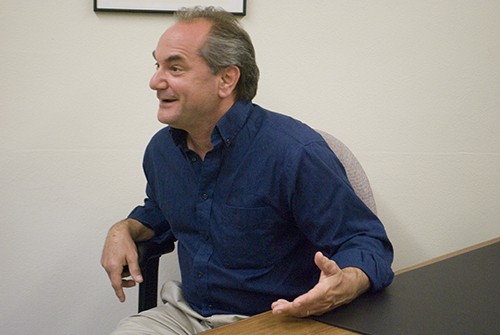The “”Decameron,”” debuting at the Rogue Theatre this weekend, takes place in Italy in 1348. But to Patrick Baliani, the translator and playwright, it might as well be set in 2008.
“”You’ll see that despite 650 years of change, we still have our basic desires, our need for each other, our insecurities, our prejudices, our longings, our fears and our hopes and dreams,”” Baliani said. “”Not much has changed.””
Two years ago on December 8, the English lecturer received an email from the play’s soon-to-be director Joe McGrath about “”The Pot of Basil,”” one of more than 100 novellas contained in Giovanni Boccaccio’s oft-referenced “”Decameron.””
“”Chaucer, Shakespeare, everyone took from the ‘Decameron,'”” Baliani said.
The professor balances his schedule between theater endeavors and grading papers for beginning English classes by waking up at 4:30 every morning to write.
It took him two years of this effort and continuous revisions — including a half-page ax to part of his original script earlier this week — to finish what he calls an exhaustive translation and reformatting of the script. Baliani’s final product takes 10 stories from the “”Decameron,”” translated by the professor from Italian into English, and weaves them into a cohesive script. Wildlife chatted about the play with Baliani in his office earlier this week.
What’s your experience with translating plays?
I’ve done quite a bit, as translation goes. I’ve translated a couple of stories and one major play. Then I did “”Six Characters In Search of an Author”” years ago and then once again for the Rogue. Actually, I’m the only person I know who has translated it twice. I didn’t even look back at the old translation. If it’s new, I redo it.
To me, I’m not creating more work for myself — your tastes differ as you grow, your abilities morph. That’s what I love about theater, it is something new every night.
So, how do you think your translation of the “”Decameron”” would change if you came back a decade later and translated it again?
I would choose 10 new stories, to start, but what else would I change? When I go into rehearsal, sometimes I feel like I’ve written a tragedy. Sometimes when I go in, it feels like a farce. Sometimes it feels extreme on the burlesque level — balancing all of that would happen the next time. And I wrote this with the actors (at the Rogue) in mind. Given Joe (McGrath’s) strong guiding hand and the accomplished actors and knowing their strengths and particular ways they work, their forces shaped the play. That I would change 10 years from now, too.
How does translating someone else’s work to fit a stage compare to writing your own words?
When you’ve written a good page, you feel energized. When you’ve translated a good page, you feel exhausted. Writing is about freeing yourself. Translating, it’s a combination of freedom and binding, it’s exhausting really. That’s why I start at 4:30 a.m. It’s about, well, I won’t call it concentration … call it entering the realm of the work. It’s easier to do that when the other realms of your life haven’t opened.
Is it hard to fit other endeavors in with your work at the UA?
People always say there aren’t enough hours in the day. I’ve come to think that there are just enough. You just need to adjust yourself and live accordingly. It’s not that I have any more hours than anyone else, but I don’t have any less hours than anyone else. I just adjust.
What should people be prepared for in this version of the Decameron?
It’s only five blocks away. … It’s a cultural treasure, the Rogue Theatre. I encourage students to come out because there’s music and acting, it’s visual and aural, and that’s what young people are all about. Often we assume that theater is for another generation, but it’s 13th-century content performed by 21st-century artists. There’s mature content, people should know about that. But people asked me, “”How are you going to get away with this without an R-rating?”” and I say, “”Our culture is X-rated. This is nothing.”” People should just be prepared for fun.









